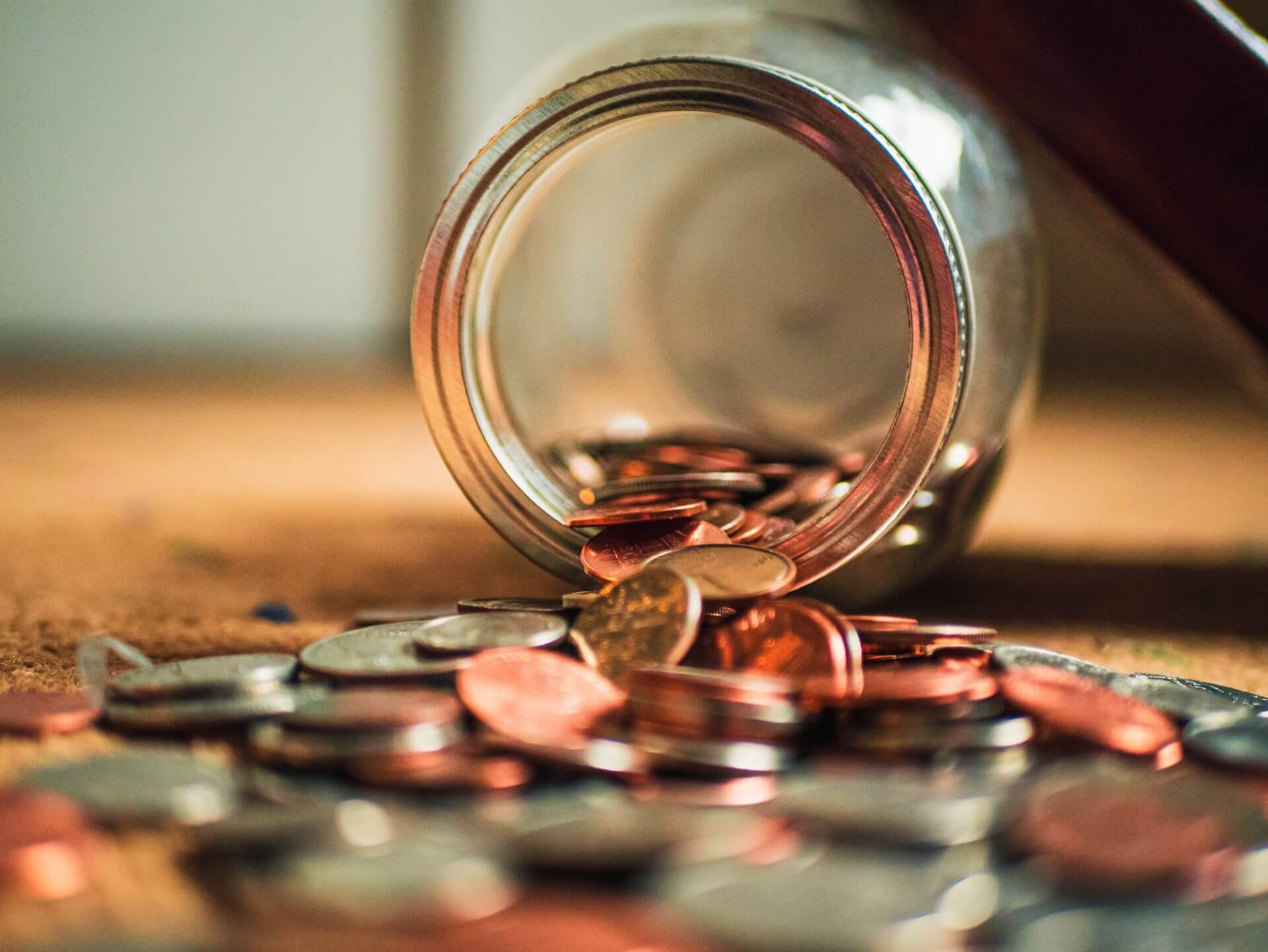
Money (18 years +)
Table of Contents
Money
Everyone likes having money. It feels good to have money to buy the things you want and need. It’s very important to learn how to manage your money so that you can afford the things you need. This section will talk about ways you can manage your money, how to protect your money, and where to go if you need help or advice.
Writing A Budget
The best way to work out what you can afford with your money is by making a budget. A budget is where you work out how much money you get each month and how much money you need to pay each month. If there is money left over then you can use this money to buy things you want or you can save it.
The first step is to work out how much money you get each month. You might get money from a job. You might get money from a pension or other Centrelink payments. Some people might get both. The second step is to work out how much money you need to pay each month. This could be things like:
• paying rent or board
• buying food
• paying power and gas bills
• paying phone bill or buying phone credit
• buying any medications you need
• paying for bus or train tickets or putting credit on your SmartRider.
To work out how much money you have left over to buy the things you want, minus the total amount of money you need to pay from the money you get.
Wants can be things like:
• new clothes
• a new CD or DVD or video game
• a movie ticket or they might be more expensive things like:
• saving up for a holiday
• saving up to buy a car.
Following is a budget for you to fill in with space to write some ideas of things you might want to save up for.
My Budget
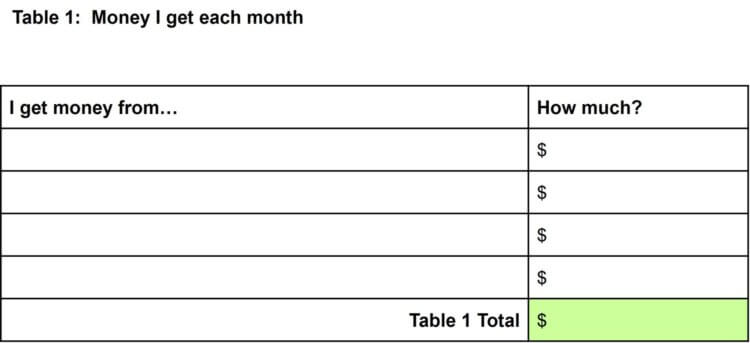
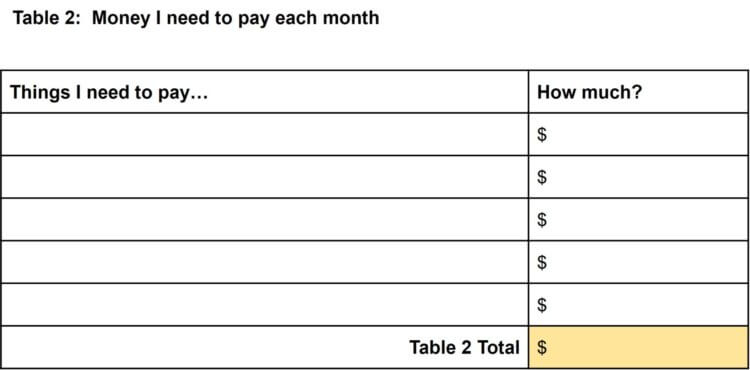
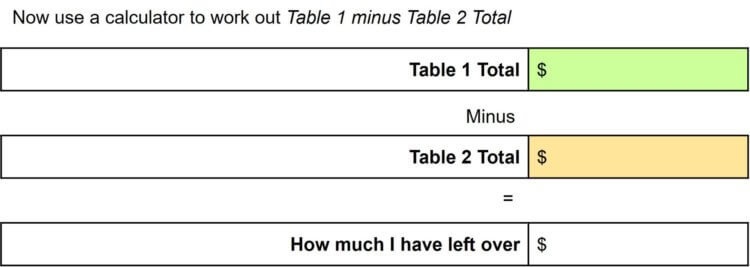
If you have more than 0 left over, well done! This means you are saving money. If you have less than 0, you are spending too much money. This is not good. You need to speak to someone you trust like a family member, friend, support person or the bank, and get them to support you in finding a better way to manage your money.
You can look at Table 3 and work out what things you can buy now and work out which things you need to save up for.
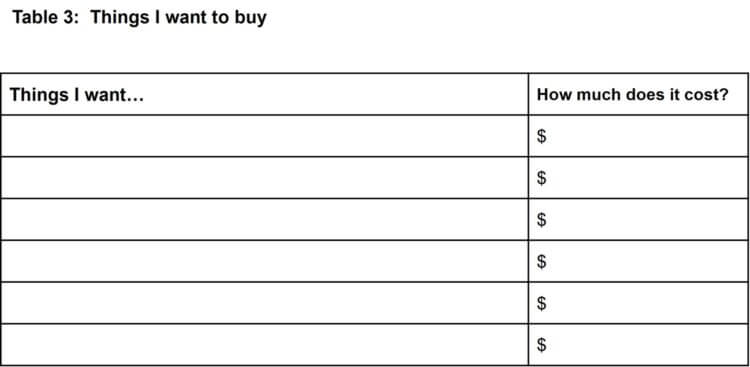
The Services Australia website has a great section about managing your money including information about budgeting, paying your debts and saving money:
Services Australia Manage Money
Manage Your Money Easy Read booklet made by the Council for Intellectual Disability has tips about managing your money and has a budget that you can print out and fill in:
The MoneySmart website has information and advice to help you manage your money and an easy to use online Budget Planner:
Banking
To get money from a job or from Centrelink you need to have your own bank account. You will need some ID (identification) like your Proof of Age Card, Passport or Driver’s Licence to open a bank account. Some banks will also want to know your Tax File Number. There are lots of different banks and accounts to choose from so ask someone you trust for help if you need help deciding which bank to open an account with. There are two main types of bank accounts:
A transaction account: a transaction account is an everyday account that your money from your job or Centrelink goes into, and the bank gives you a card called a debit card that you use to pay for things using the money in your transaction account. You can also use your debit card to get out money from ATM’s and to pay for things online.
A savings account: a savings account is an account that you can put money into if you’re saving up for something, like a holiday or a car. Most savings accounts let you earn interest, which is when you get a small amount of money put in your account from the bank each month as long as you keep saving. The more money you have in your savings account the more interest you earn. Some savings accounts have bank cards and some don’t so you will have to ask your bank.
Commonwealth Bank has made this Easy English guide about banking:
Centrepay
If you get money from Centrelink you can ask them to take money out of your payment for bills using Centrepay. You can use Centrepay to pay your rent, power and gas bills, internet bills, court fines and more. Centrepay is free to use. Find out more about Centrepay by visiting the Services Australia website:
Credit Cards & Loans
Sometimes you might want to buy something that you don’t have the money for right now, like a car or a holiday. Banks and finance companies may offer you a loan so you can buy what you want now. A loan is where the bank or finance company lets you borrow the money from them, and you pay it back over time.
You must also pay interest on your loan. Interest is extra money on top of the amount you borrowed. A credit card is similar to a loan except that the bank gives you a bank card that you can use to buy things with. When you use the credit card to buy something, the bank lets you borrow the money, and you pay
it back over time. You must also pay interest on a credit card. Interest is extra money on top of the amount you borrowed.
A loan or a credit card might seem like a good idea, but it is a very big decision so it’s important to know all the details before you agree to getting one. For example, borrowing a $5000 loan from the bank and you need to pay it back within 3 years. If the bank charges 10% interest, you will end up paying the bank back almost $6500 by the end of the 3 years!
A payday loan is a small loan from a finance company that you pay off in a short amount of time which can be anywhere between a month and a year. It might seem like a good idea but payday loans charge very high interest. For example, if you got a $1500 payday loan that needs to be paid back within 6 months, you would end up paying back over $2000 by the end of the loan!
Some important things to think about before getting a loan or a credit card are:
• Do I really need the item the loan or credit card is for, or is it just something I want?
• Can I afford to get a loan or credit card?
If you don’t have much money left after paying for the things you need each month, then you probably can’t afford to get a loan or credit card
• Is there a better way I can get the money for the things I want?
Like saving up, getting a Centrelink advance, or seeing if your parents can lend you the money so you don’t have to pay any interest.
You can learn more about loans and credit cards on the Services Australia website:
Service Australia Loans and Credit
The MoneySmart website has a section all about Loans including a Personal Loan Calculator and a Payday Loan Calculator which let you type in the loan amount and interest rate and tells you how much you’d have to pay back:
No Interest Loan Scheme (NILS)
If you have a Health Care Card or Pensioner Concession Card you might be able to get a loan through the No Interest Loan Scheme (NILS). NILS gives loans of up to $1500 and there’s no interest to pay. Some of the things you can use a NILS loan for are:
• household items like a washing machine, fridge, TV or computer
• health related items like a wheelchair, mobility scooter, or to get dental work done
• equipment and tools if you’re doing an apprenticeship
• car related items like driving lessons, car registration, car repairs or new tyres.
To find out more about NILS call (08) 9263 2199 or visit the WA NILS website:
Where to get money advice & support
A person who is trained to support you by giving you advice and information about money is called a financial counsellor. You can get free financial counselling almost anywhere in WA.
You can call the National Debt Helpline on 1800 007 007 to talk to a financial counsellor or you can use the websites below to help you find free financial counsellors in your area by entering your postcode or clicking on their interactive maps:
National Debt Helpline
NDH Find a Financial Counsellor
MoneySmart
Doing Your Tax
Most people that have a job or get money from Centrelink need to do a tax return. Doing a tax return helps the Government know if you paid enough tax during the year. If you ended up paying too much tax during the year then you might get some money back after doing your tax return. Most people do their tax return in July, but you have until 31 October each year to do it. Doing your tax return can sometimes be confusing, but there are a few ways you can get help to do it:
MyTax
If you have a MyGov account you can do your own tax return online using MyTax. You can find out more information about MyTax at:
TaxHelp
You can get someone to do your tax return for you for free using the TaxHelp program. TaxHelp has trained volunteers that do tax returns for people with disabilities and people on low incomes. You can learn more about TaxHelp by calling the Australian Tax Office (ATO) on 13 28 61 or visit their website at:
Or you can pay a tax agent to do your tax return for you. A tax agent is a person who is professionally trained in doing tax returns. You can use your suburb name or postcode to search for a tax agent in your area at:
If you need advice or have questions about doing your tax return call the ATO on 13 28 61 (Monday to Friday 8am – 6pm AWST, Saturday 10am – 2pm AWST), or you can find out more in the ATO’s Easy Read booklet ‘How to do your tax’:
Consumer Protection Rights
In Australia, whenever you buy a product or service in-person, on the phone or online you have legal rights called consumer protections. Some of your consumer protections are:
• you have the right to ask as many questions as you want about a product or service
• you have the right to take your time making the decision whether to buy it or not
• you have the right to say no if you don’t want to buy it anymore or if the seller is being pushy
• you have the right to be given all the important and correct information about a product or service you want to buy
• a product or service must live up to any guarantees (promises) about what it’s supposed to do
• you have the right to speak up if a product breaks or doesn’t work how it’s meant to
• you have the right to speak up if a service wasn’t done properly
• if a product is being delivered you have the right to receive it within a reasonable amount of time.
The first thing you should do if you aren’t happy with a product or service you bought is call the person or business you bought it from. Make sure you keep your receipt because this will prove when and where you bought the item. If the product is faulty (this means it’s broken or doesn’t do what it’s supposed to) and
you have the receipt then the person or business has to organise a repair or replacement or give you your money back – this is called a refund.
If the person or business refuses to help solve the problem you can call Consumer Protection on 1300 304 054 or lodge your complaint using their online form:
Commerce WA Consumer Complaint
You can also lodge a complaint in person at one of the Consumer Protection offices below: (Open Monday to Fridays, 9am – 5pm)
Bunbury
8th Floor, 61 Victoria Street, Bunbury
Phone: (08) 9722 2888
Albany
Unit 2/129 Aberdeen St, Albany
Phone: (08) 9842 8366
Perth
Level 2, 140 William St, Perth
Phone: 1300 304 054
Council for Intellectual Disability (CID) has an Easy Read guide about how to make a complaint about goods or services:
Scams
A scam is when someone lies about who they are or what they are selling so they can steal your money. An example of being scammed is if you got a call from someone saying they’re from your bank and they ask you to confirm your bank account details, and then suddenly a lot of money is missing from your
account. Another example is if you bought a product online, but the package never arrives and then when you go to contact the seller their website has disappeared.
Scams don’t happen very often but it’s important to know the signs of a scam. To learn how to spot a scam, find out about current scams or to report a scam visit ScamWatch:
Sometimes people pretend to be staff from a government department such as Centrelink or the Australian Tax Office to try and get personal details like your name, address or bank details. The Services Australia website shows you how to tell the difference between real contact from a government agency and
a scam:
Services Australia How to Know a Scam
The MoneySmart website has information about Banking and Credit Scams:
Emergency Financial & Food Assistance
If you are struggling to get enough money to pay your bills or buy food, there are lots of places that can help:
WA Emergency Relief and Food Access Service
Helps you find and apply for emergency financial assistance and food relief in your area. Make sure you have a form of ID (such as a Proof of Age Card, Passport or Drivers Licence) as well as your Medicare Card or Health Care Card or Pensioner Concession Card details when you call.
Free call: 1800 979 777 (Monday to Friday, 9am – 5pm)
After hours online enquiry form: FCN Emergency Relief
Anglicare WA
Anglicare WA can help with emergency financial assistance, food hampers and financial counselling. They have 10 offices across the South-West WA and Great Southern WA regions. To find one near you call 1300 11 44 46 or visit the Anglicare WA website:

